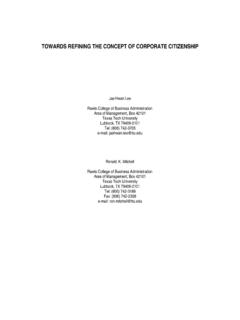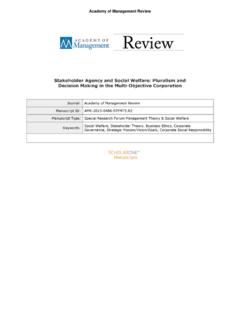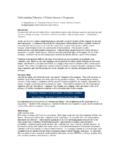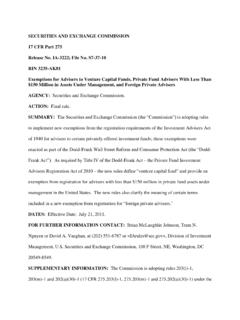Transcription of FAILING TO SUCCEED: NEW VENTURE FAILURE AS A …
1 FAILING TO SUCCEED: NEW VENTURE FAILURE AS A MODERATOR OF STARTUP EXPERIENCE AND STARTUP EXPERTISE Ronald K. Mitchell, University of Victoria J. Robert Mitchell, Indiana University J. Brock Smith, University of Victoria ABSTRACT In this study we investigate new VENTURE FAILURE . We do this in two ways: first, by testing for moderating effects of new VENTURE FAILURE on the relationship between startup experience and perceived startup expertise with a sample of 220 entrepreneurs; and second, by qualitatively exploring the nature of these relationships, drawing insights from interviews with these 220 entrepreneurs. Our results show a disordinal crossover moderating effect of new VENTURE FAILURE in the relationship between startup experience and startup expertise, and also assist in the interpretation of these results. We illustrate, for practice: more productive outcomes from initial new VENTURE FAILURE , and for research: a deeper understanding of the bubbling cauldron of new VENTURE FAILURE .
2 INTRODUCTION New VENTURE FAILURE has been portrayed both positively ( , McGrath, 1999) and negatively ( , Dickinson, 1981). While the negative effects of FAILURE are manifest in monetary and emotional costs, its positive effects are less visible being associated with learning, experience, and other cognitive constructs. Most lenders and VENTURE capitalists consider a previous FAILURE to be a virtue of finance seeking entrepreneurs but why? Despite significant research interest in the topic of FAILURE ( , Shepard, 2003; McGrath, 1999; Sitkin, 1992), the positive aspects of new VENTURE FAILURE have not been empirically verified. To do so is important for stakeholders to know how to treat new VENTURE FAILURE . In this study, we begin to address this issue by examining whether new VENTURE FAILURE moderates the relationship between startup experience and expertise, and if so, how.
3 We further consider the nature of any startup expertise differences that appear between those entrepreneurs who have failed in a new VENTURE , and those who have not failed. In doing so, we build on the work of previous researchers who have taken a cognitive perspective in examining new VENTURE FAILURE (Shepherd, 2003; Zacharakis, Meyer, & DeCastro, 1999). The report of our study proceeds as follows. We first examine the literature to explore the meaning of and past research related to the key constructs that we use to develop our research model: startup expertise, startup experience, and new VENTURE FAILURE . In the methods section which follows our literature review, we describe the data gathering, measurement and analysis approaches that we have used to obtain the results that we report therein, including the gathering and transcription of the focused interviews we use to help us to better interpret our findings.
4 In the final section of the paper, we discuss and explain how this study helps us to illustrate, for practice: more productive outcomes from initial new VENTURE FAILURE , and for research: a deeper understanding of the bubbling cauldron of new VENTURE FAILURE . 2 THEORY & HYPOTHESES Background New VENTURE FAILURE has been a topic of study for at least two decades. It has been investigated in one form or another at multiple levels of analysis: in the economy (McGrath, 1999; Shane, 1996), in organizational populations (Hannan & Freeman, 1989), in firms (Azoulay & Shane, 2001; Gimeno, Folta, Cooper, & Woo, 1997; Holmberg & Morgan, 2003; McGrath, 1999), and in individuals (Shepherd, 2003; Zacharakis, Meyer, & DeCastro, 1999). FAILURE has been portrayed in both a positive ( , McGrath, 1999; Sitkin, 1992) and negative ( , Dickinson, 1981) light. It has been linked to entrepreneurial grief (Shepherd, 2003), learning (Minniti & Bygrave, 2001; Sitkin, 1992), risk and reward (McGrath, 1999), and numerous other socio-economic phenomena ( , Begley & Tan, 2001).
5 Several theoretical frameworks have been used to address why some entrepreneurs succeed while others do not. Personality theory has attempted to distinguish between entrepreneurs and non-entrepreneurs based on the characteristics or traits of these individuals (Brockhaus & Horowitz, 1986; Carland, Hoy, Boulton & Carland, 1984; Hull, et al, 1982; McClelland, 1965, 1968). The behavioral approach of describing entrepreneurship distinguishes between entrepreneurs and non-entrepreneurs based on the entrepreneurial activities undertaken (or not undertaken) by these individuals (Gartner, 1989). A number of cognitive theories have also been applied to addressing the question of entrepreneurial success v. FAILURE . In this study, we utilize one such view: expert information processing theory, which suggests that expert entrepreneurs possess a differential ability to transform, store, recover and use information that novice entrepreneurs miss (Mitchell, Smith, Seawright, & Morse, 2000).
6 According to this theory, it is the knowledge structures or scripts possessed by experts that allow them to significantly outperform non-experts who do not possess such structured knowledge (Ericsson, Krampe, & Tesch-Romer, 1993; Glaser, 1984; Leddo & Abelson, 1986; Lord & Maher, 1990; Read, 1987). Accordingly, expert information processing theory suggests that some entrepreneurs succeed where others do not, in large part due to the expertise they possess. But what drives expert performance? One explanation relates experience to expert performance. In their study of 52 technical ventures, Stuart and Abetti (1990) found that the leader s entrepreneurial experience was the primary determinant of superior performance suggesting a relationship between experience and expertise. But not all experience results in learning (Brehmer, 1980). A well-known adage suggests that twenty years of experience is qualitatively different from one year of experience repeated twenty times.
7 Model Development Use of a social cognition framework that focuses on the person-environment interaction (Fiske & Taylor, 1984) provides insights into the effects of feedback on the relationship between experience and expertise. Echoing the sentiment captured within the above adage, Russo and Schoemaker (1992) suggest that for experience to result in learning, an individual must receive feedback from the environment about that experience. This fits a conceptualization of 3entrepreneurial learning proposed by Minniti and Bygrave (2001) who suggest that entrepreneurs only repeat choices that result in positive feedback, and discard choices that result in negative feedback. Within this study, we examine new VENTURE FAILURE , a particular form of often negative feedback that, according to the foregoing logic, may moderate the relationship between startup experience and expertise (Figure 1).
8 Thus we hypothesize, Hypothesis 1: Entrepreneurs who have failed will have higher levels of expertise relative to experience than those entrepreneurs who have not failed. To further understand the nature of any relationship between FAILURE , experience, and expertise we rely on post-hoc analysis of qualitative data also gathered in the study. METHODS Sample Hypotheses were tested using a sample of 220 entrepreneurs from multiple countries (primarily Canada), all of whom were chosen by entrepreneurship students between 1997 and 2003 to provide questionnaire and focused-interview input to the students in a mentor/student context. The authors provided an interview guide to the students consistent with the methods suggested in Mitchell & Chesteen (1995). The interviews were recorded and transcribed by the students. In addition, each entrepreneur completed a self-report questionnaire along with a consent form permitting this information to be used for academic research.
9 All of the respondents considered themselves entrepreneurs, and 67% had started three or more businesses. Forty-two percent had experienced at least one new VENTURE FAILURE . The respondents ranged in self-reported experience and expertise and operated in a variety of industries. Respondent ages ranged from 20 to 81 (mean = 45), and 86% were male. Consistent with the difficulty of accessing sampling frames for probability samples in social science research (Pedhazur & Schmelkin, 1991), and in entrepreneurship research in particular (McDougall & Oviatt, 1997: 303), a purposeful sampling approach was utilized, where students selected only individuals who had a threshold level of entrepreneurial experience (as noted below). As such, we consider the sample to be appropriate for a theory-building exploratory study such as the one reported in this paper. Measures The extent of entrepreneurial experience was measured with a summed four-item scale that incorporated both subjective and objective indicators.
10 The one subjective item was a self-report item that asked respondents to rate their past experience on a semantic differential scale with anchors of limited and experienced. Responses were coded into a 9-point interval scale and were then recoded by dividing the scale by 9 to match the nominal scales used in measuring the other items. The three objective, nominally scaled items were: I have started three (3) or more businesses, at least one of which is a profitable, on-going entity; I have started at least one (1) business that has been in existence for at least two years; and I have significant career experience that makes me highly familiar with new VENTURE formation. These four items were summed, and for analytic purposes, recoded into a categorical experience variable with approximately equal sized categories of high (69 cases), medium (81 cases), and low (63 cases) experience levels.








